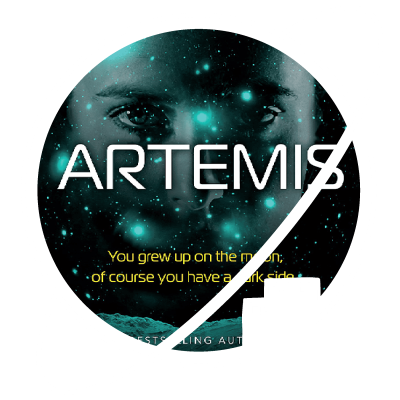- Book written by Andy Weir
- Published 14 November 2014
- Standalone
Jazz Bashara lives in Artemis, earth’s first colony on the moon. She is also poor, a petty criminal and a deep disappointment to her father, who is a well-respected member of the community. In his eyes, Jazz is capable of so much more than her current job as a porter. He’s not wrong: when the chance at a really large stack of money comes by, Jazz is first in line to take the opportunity, legel or not. She soon realises, however, that the job got her entangled in a game with the future of Artemis itself at stake…


“Does for the moon what the Martian did for Mars!” is one of the cover blurbs for my version of this book. Which is fascinating, because, unlike most blurbs, it’s not just praise taken out of context – it’s not even praise at all. It’s just a description. In a blurb.
It’s surprisingly apt, however, and probably good marketing. Weir is known for The Martian, and if you liked that and want more, well, there is Artemis. You don’t need some snob from the Guardian telling you whether it is good or not. And the book is probably not intended for people who haven’t read The Martian yet.
So what am I doing, trying to review this book? It seems pretty simple – if you enjoyed The Martian, you’ll enjoy this one too, right?
Broadly speaking, that’s true. The story is told in a very similar talk-to-the-camera, snappy, sassy, upbeat, no-drama style. The characters encounter relatively similar types of issues in a relatively realistic near-future sci-fi world. Weir makes his usual blatant mistakes in international space law. It reads very easily, is very well-paced, is humorous at times. It gives you a good idea of what a city on the moon in the relatively near future might look like, just like The Martian did for a Mars mission. If those were elements you enjoyed in The Martian, you’ll probably enjoy them here too.
There are differences too, however, and generally speaking, The Martian comes out on top. For me, the most obvious difference is that while both stories are fiction, the challenges Jazz faces in Artemis felt a lot more made up than Watney’s struggle in The Martian. This is probably because the setting of a moon colony is simply a lot more flexible, meaning that Weir has some more leeway in making Jazz’ life easy or tough as the plot demands. The result is that while reading Artemis, I never really felt like Jazz’ life was in danger. And where Watney’s motivation is very clear from the very start of the novel, Jazz’ seems to be all over the place.
Perhaps more importantly, Artemis feels a bit like Weir’s publisher told him to just do the same trick in a new setting – and some of what made The Martian original and compelling is gone. Instead, we see other more traditional plot devices enter the stage – elements of romance, crime, politics, etc. Weir seems to have had Neuromancer‘s Freeside space station very firmly in mind when designing Artemis. It could be argued that Artemis sits in strange spot somewhere in between whatever The Martian is and traditional science fiction. That seems really cool, but didn’t work as well for me as The Martian did – but it might for you!
One final thought is that the book manages to sexualise Jazz’ character quite a lot, despite being told from her own perspective. I have nothing against a sex-positive main character, and perhaps this is just me being prudish, but some of the things Jazz thinks and does feel very ‘male gaze’. Make of that what you will.
in conclusion, you may have noticed that I referenced The Martian a lot in this review. That is because it is quite simply a very similar, but also clearly better book than this one. So if you haven’t read that one yet, go read it first and come back after. If you have read The Martian and liked the style, I am sure Artemis has something to offer for you as well. It is quick, witty, easy to read. Just don’t expect it to be equally good.










